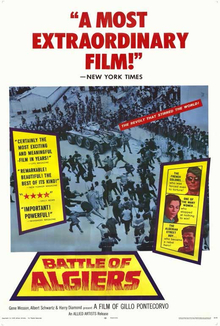
Back معركة الجزائر (فيلم) Arabic معركه الجزائر ARZ La Battaglia di Algeri AST লা বাত্তালিয়া দি আলজেরি Bengali/Bangla La Battaglia di Algeri Catalan La Bataille d'Alger CY Schlacht um Algier German Η μάχη της Αλγερίας Greek La Batalo de Alĝero EO La batalla de Argel Spanish
| The Battle of Algiers | |
|---|---|
 U.S. theatrical release poster | |
| Italian: La battaglia di Algeri Arabic: Maʿrakat al-Jazāʾir | |
| Directed by | Gillo Pontecorvo |
| Written by | Franco Solinas |
| Story by | Franco Solinas Gillo Pontecorvo |
| Based on | Souvenirs de la Bataille d'Alger by Saadi Yacef |
| Produced by | Antonio Musu Saadi Yacef |
| Starring | Jean Martin Saadi Yacef Brahim Haggiag Tommaso Neri |
| Cinematography | Marcello Gatti |
| Edited by | Mario Morra Mario Serandrei |
| Music by | Ennio Morricone Gillo Pontecorvo |
Production companies | Igor Film Casbah Film |
| Distributed by | Allied Artists (USA) |
Release dates |
|
Running time |
|
| Countries | Italy Algeria |
| Languages | Arabic French |
| Budget | $806,735 |
| Box office | $879,794 (domestic)[2] |
The Battle of Algiers (Italian: La battaglia di Algeri; Arabic: معركة الجزائر, romanized: Maʿrakat al-Jazāʾir) is a 1966 Italian-Algerian war film co-written and directed by Gillo Pontecorvo. It is based on action undertaken by rebels during the Algerian War (1954–1962) against the French government in North Africa, the most prominent being the eponymous Battle of Algiers, the capital of Algeria. It was shot on location in a Roberto Rossellini-inspired newsreel style: in black and white with documentary-type editing to add to its sense of historical authenticity, with mostly non-professional actors who had lived through the real battle. The film's score was composed by Pontecorvo and Ennio Morricone. It is often associated with Italian neorealist cinema.[3]
The film concentrates mainly on revolutionary fighter Ali La Pointe during the years between 1954 and 1957, when guerrilla fighters of the FLN went into Algiers. Their actions were met by French paratroopers attempting to regain territory. The highly dramatic film is about the organization of a guerrilla movement and the illegal methods, such as torture, used by the French to stop it. Algeria succeeded in gaining independence from the French, which Pontecorvo addresses in the film's epilogue.[4]
The film was met with international acclaim, and it is considered to be one of the greatest films of all time. It won the Golden Lion at the 27th Venice Film Festival among other awards and nominations. It also was nominated for the Academy Award for Best Foreign Language Film. A subject of sociopolitical controversy in France, the film was not screened in the country for five years.[1] Insurgent groups and state authorities have considered it to be an important commentary on urban guerrilla warfare. In Sight and Sound's 2022 poll of the greatest films of all time, it ranked 45th on the critics' list and 22nd with directors.
In 2008, the film was included on the Italian Ministry of Cultural Heritage's 100 Italian films to be saved, a list of 100 films that "have changed the collective memory of the country between 1942 and 1978."[5]
- ^ a b Malcolm, Derek (July 20, 2000). "Gillo Pontecorvo: The Battle of Algiers". The Guardian.
- ^ "The Battle of Algiers (1967) – Box Office Mojo". www.boxofficemojo.com.
- ^ Shapiro, Michael J. (August 1, 2008). "Slow Looking: The Ethics and Politics of Aesthetics: Jill Bennett, Empathic Vision: Affect, Trauma, and Contemporary Art (Stanford, CA: Stanford University Press, 2005); Mark Reinhardt, Holly Edwards, and Erina Duganne, Beautiful Suffering: Photography and the Traffic in Pain (Chicago, IL: University of Chicago Press, 2007); Gillo Pontecorvo, director, The Battle of Algiers (Criterion: Special Three-Disc Edition, 2004)". Millennium: Journal of International Studies. 37: 181–197. doi:10.1177/0305829808093770.
- ^ "Gillo Pontecorvo: The Battle of Algiers". The Guardian.
- ^ "Ecco i cento film italiani da salvare Corriere della Sera". www.corriere.it. Retrieved March 11, 2021.